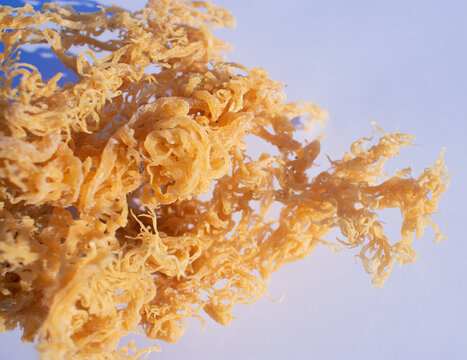
Reprinted: CNW, 7-28-2023
A marine marvel, the seaweed known as sea moss or Irish moss, predominately found in the Atlantic Ocean, holds a special place not only in the Caribbean Sea but also along the Irish coastlines. This red algae variant has made a name for itself in the realm of natural thickeners used in diverse food items and cosmetic solutions.
Diverse uses and applications
Employed in a multitude of forms – as a gel, in powdered form, or as an addition to stews, soups, and smoothies, sea moss is cherished for its hydrating and soothing attributes. These properties have made it a common feature in skincare commodities.
Notwithstanding these benefits, sea moss may not be entirely devoid of potential side effects. Thus, experts advise engaging with a healthcare provider before incorporating sea moss as a dietary supplement.
Exploring the multi-faceted health benefits of Caribbean sea moss
The significant health benefits of sea moss have boosted its popularity as a potential superfood. This has raised several questions including: Is Caribbean sea moss the next big health food? To explore this, let’s delve into some health benefits of sea moss, as outlined by Cleveland Clinic:
- It’s heart-healthy
Seaweed stands out as a nutritional powerhouse. Its fiber content surpasses that of many vegetables, which is a significant advantage, given the wide array of health benefits linked to dietary fiber. Fiber can enhance blood sugar regulation, aid in lowering cholesterol levels, and mitigate the risk of chronic illnesses such as diabetes and heart disease.
Research also indicates that sea moss could contribute to reducing bad cholesterol, while evidence suggests that it may help decrease blood pressure, another essential element of heart health.
2. It may promote weight loss
Sea moss has high-fiber foods that are filling foods, which means they may keep you from overeating. Experts say this may help with weight control.
3. It’s a good source of iodine
Iodine plays a crucial role in maintaining thyroid health. Since the body lacks the capability to produce iodine independently, dietary intake becomes the only source. Despite this, the majority of individuals usually meet their iodine needs through the consumption of dairy products, seafood, and iodized salt.
4. It supports gut health
Your digestive system is full of bacteria, some good and some bad. And because gut health is associated with overall health, balancing out those bacteria is an important element of your wellness. Algae, including sea moss, is a good source of fiber and live bacteria. “It can help replenish the good bacteria in our gut,” Czerwony says.
5. It may boost your immunity
A well-functioning gut is often linked to a strong immune system. The sea moss is packed with iron and antioxidants, which are known to boost immune health.
6. It can build muscle and aid in workout recovery
Sea moss is a good source of taurine, an amino acid known to aid in muscle development. Research shows that with approximately 6 grams of protein per 100 grams, sea moss can be a valuable addition to your exercise regimen. Balancing it with sufficient intake of nutritious foods, proper hydration, and adequate rest is vital.
With its expansive health benefits, it’s clear that sea moss may indeed be ready for its moment in the health food spotlight.